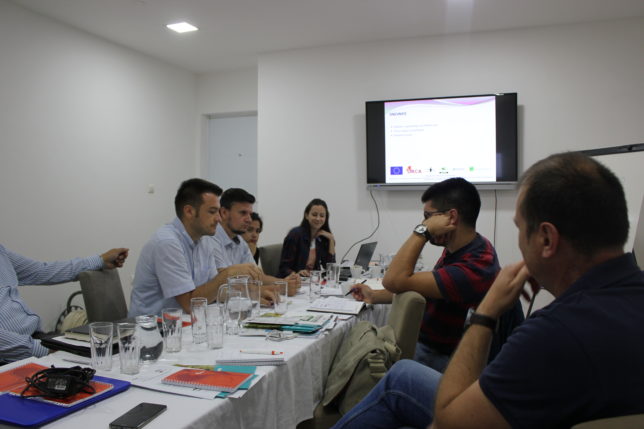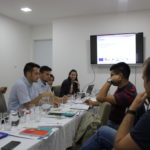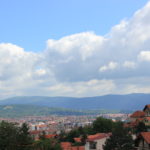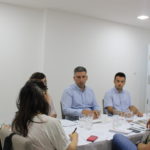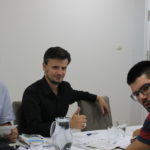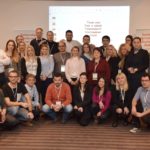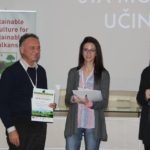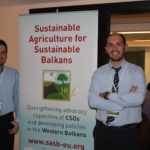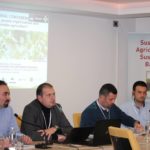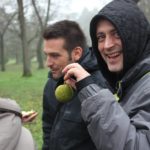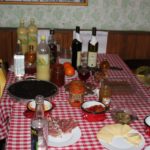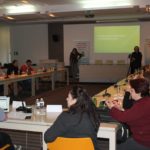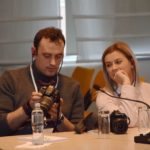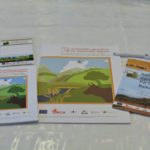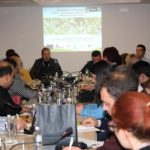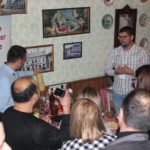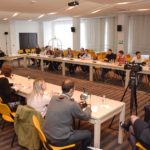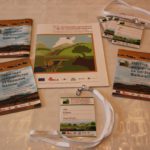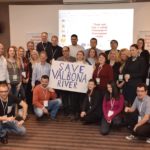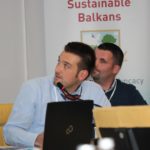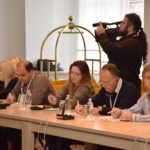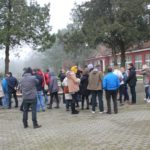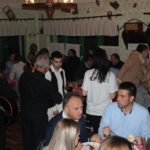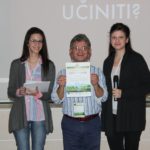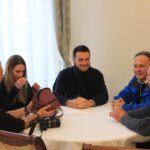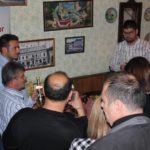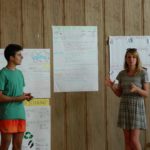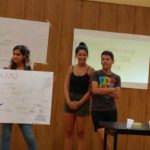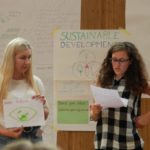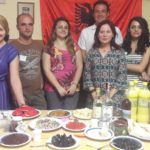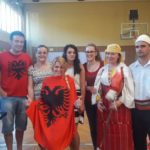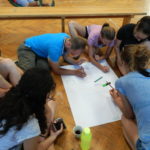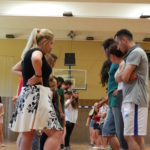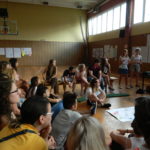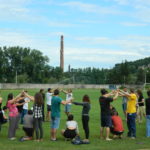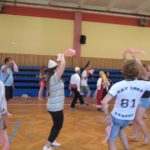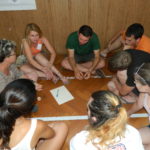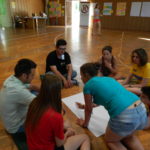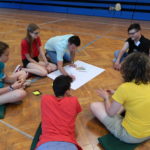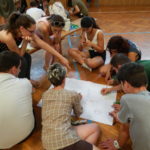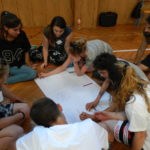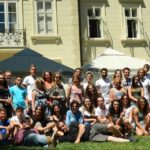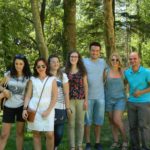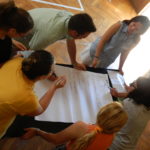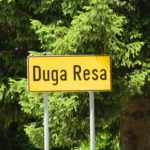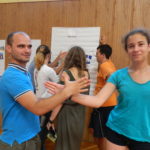IEP participated at the 2nd Mediterranean Plant Conservation Week “Conservation of Mediterranean Plant Diversity: Complementary Approaches and New Perspectives”, organized by CEPFMed from 12-16 November in Malta.

Category: Uncategorized
Sustainable Agriculture for Sustainable Balkans 5th Coordinating Meeting
5th Coordinationg Meeting for the project Sustainable Agriculture for Sustainable Balkans (SASB) was held from June 22nd to June 24th in Niš, Serbia.
The project “Sustainable agriculture for sustainable Balkans: Strengthening advocacy capacities of CSOs and developing policies in the Western Balkans” is aimed to strengthen advocacy capacities of CSOs using research, training and networking.
Partners reviewed the activities funded through the sub-granting and grant and training scheme, discussed about new joint initiatives with the grantees, and set the plan for the Regional Policy Framework and the Regional Working Platform made of CSOs, public authorities and scientists, which will develop regional policy in the area of sustainable agriculture, biodiversity conservation and animal welfare at the territory of Western Balkans. This policy will be developed based on research aimed at providing information about High Nature Value Farming in the Western Balkans.
Project is implemented by consortium of CSOs from Republic of Albania (Institute for Environmental Policy – IEP), Republic of Northern Macedonia (FLOROZON), Republic of Kosovo (NGO AKTIV) and Republic of Montenegro (Center for Protection and Research of Birds – CZIP), led by Organisation for Respect and Care of Animals – ORCA from Republic of Serbia.
This project is funded by the European Union. The content above is the sole responsibility of IEP and under no circumstances should it be viewed as an EU position.
Monitoring visits at the 3 Albanian NGOs, beneficiaries of sub-granting
During the month of April, 2018, IEP team conducted three monitoring visits at the 3 Albanian NGOs, which were beneficiaries of the sub-granting component in the framework of the project “Sustainable agriculture for sustainable Balkans: Strengthening advocacy capacities of CSOs and developing policies in the Western Balkans”, project which is aimed at strengthening the capacities of civil society organizations for public advocacy and developing regional policies in the field of sustainable agriculture, protection of biodiversity and animal welfare in the area of the Western Balkans.
The 3 Albanian NGOs which implemented their projects during June 2017-June 2018, where:
1) Royal Albanian Foundation. Project: Advocacy on Small Ruminants Animal Health, Production and Welfare in Rural Areas of Gjirokaster Region-southern Albania
2) Centre of Study, Use & Management of Natural Resources (QSK NATYRA). Project: Consolidation of agricultural land as an instrument for sustainable development of agriculture
3) Agro-Environmental & Economic Management-Center, AEEMC. Project: Advocating to a more decentralized, participatory and integrated forms of water policy

Regional conference for the media in the Western Balkans
REGIONAL CONFERENCE FOR MEDIA IN THE WESTERN BALKANS
Regional Conference “MEDIA, CSOs AND SUSTAINABLE AGRICULTURE”, brought together on one “Sustainable table”, the media representatives from Albania, Montenegro, Serbia, Republic of Macedonia, and Republic of Kosovo.
Regional conference “Media, CSOs and sustainable agriculture” was held in Zrenjanin, Serbia, from 15-17 December 2017. Participants were more than 30 journalists from Albania, FYR Macedonia, Montenegro, Kosovo and Serbia. Conference was part of the project “Sustainable Agriculture for Sustainable Balkans”, funded by the EU, implemented by the consortium of CSOs from the Western Balkan countries and led by ORCA. The aim of our regional conference was to share important and interesting information with the representatives of the media in the Western Balkan region, about current issues related to sustainable agriculture, such as nature protection in agricultural areas, impacts of climate change on agriculture, importance of animal welfare for food safety, experiences of FYR Macedonia and Serbia in application of agri-environment measures, etc.
These topics were presented to guests by our esteemed presenters – prof. Vladimir Dimitrijević, PhD and docent Branko Petrujkić, PhD from the Faculty of Veterinary Medicine in Belgrade, Jelena Burazerović from the Faculty of Biology in Belgrade and longtime team member of ORCA, Velika Atanasova, founder of the Agro journalists’ Association of FYR Macedonia, Uroš Davidović, author of the TV show “Good Land” and Mladen Jovanović, president of the Board at National Coalition for Decentralisation and the consultant at the European Non-profit Strategies.
“Sustainable table and the excursion to the Kaštel castle in Ečka”
At the conference, participants had the opportunity to connect and share experiences and ideas with colleagues from the region. During “Sustainable table”, the participants could taste local foods and homemade specialties brought by their colleagues, such as Montenegrin prosciutto (ham), cheeses and vines, homemade pies, boza and fruit rakias (brandies) from Albania, cookies, dry fruit, ajvar (pepper-based food) and višnjevača (rakia made from sour cherries) from Macedonia and jams and chocolates from Serbia. In addition, participants had the opportunity to visit Kaštel castle in Ečka and receive very interesting information from a professional tour guide, about agriculture development in this part of Banat region in Serbia.
Reminder:
Regional project “Sustainable agriculture for sustainable Balkans: Strengthening advocacy capacities of CSOs and developing policies in the Western Balkans” is aimed at strengthening the capacities of civil society organizations for public advocacy and developing regional policies in the field of sustainable agriculture, protection of biodiversity and animal welfare in the area of the Western Balkans.
Project is implemented by consortium of CSOs from Albania (Institute for Environmental Protection – IEP), FYROM (FLOROZON), Kosovo (NGO AKTIV) and Montenegro (Center for Protection and Research of Birds – CZIP), led by Organisation for Respect and Care of Animals – ORCA from Serbia. The project lasts four years (2016-2019) and is funded by the European Union, represented by European Commission, Directorate General for Neighbourhood and Enlargement Negotiations (DG NEAR) as part of Civil Society Facility and Media Programme 2014-2015. Total budget of the project is 960.760 EUR.
Pictures from the activity:
(Shqip) “Bëj një ndryshim për kafshët endacake” – Takimi i Politikës për Kafshët
The Institute for Environmental Policy participated in the launching of HERMES project in Varna, Bulgaria, 31.08-01.09.2017
International workshop – discussion on shoreline and prevention of the coastal erosion of the Adriatic, Aegean, Mediterranean and Black Sea was held in the Varna Governors office on 31st of August, 2017. The international meeting was organized within the framework of the newly-launched project “HERMES – A HarmonizEd fRamework to Mitigate coastal EroSion promoting ICZM protocol implementation”, co-funded by the Balkan-Mediterranean Program. The aim of the workshop was to introduce HERMES project to local stakeholders, to increase knowledge about coastal erosion mitigation and to initiate networking. 
The workshop was officially opened by the Regional Governor of Varna – Mr. Stoyan Pasev and the Chairman of the Board of the Union of Bulgarian Black Sea Local Authorities (UBBSLA) – Mr. Atanas Stoilov.
Project’s partnership is composed of Municipality of Paggaio (GR), which is the leading organization of the project, Democritus University of Thrace (GR), Union of Bulgarian Black Sea Local Authorities -UBBSLA (BG), ORION Joint Research Center (CY), TEULEDA, Local Development Agency (AL) and the Institute for Environmental Policy (AL). Its expected duration is 24 months (August 2017-August 2019) and the total budget exceeds 1,000,000 euros.
HERMES workshop on coastal erosion in Varna was attended by more than 40 representatives of the member municipalities of UBBSLA, project partners from Greece, Cyprus and Albania, representatives of the Institute of Oceanology, Regional Inspectorate of Environment and Waters – Varna and other experts in the area of shore and erosion control. Within the framework of the open workshop, an authoritative review of ICZM legislative framework in Bulgaria and the implemented project on the Bulgarian Black Sea coast were presented, as well the technical solutions developed in the framework of projects for prevention of coastal erosion. 
Representatives of the project’s partners introduced their institutions/organizations, the state of the coasts in the respective pilot areas covered by the project, and the action plan for the next 6 months.
HERMES is a common initiative of six entities, supported by the European Union through the Balkan Med Program, covering over 280km of coastline in the Adriatic, the Aegean, the Levantine and the Black Sea designed to help local communities come up with concrete and viable solutions. It aims to develop a unified and harmonized framework for coastal erosion mitigation and beach restoration through the implementation of a coherent ensemble of studies, the sharing of already developed technical tools and the design of joint policy instruments. 

Under the project, special stations for monitoring wind and current waves will be purchased and installed in each partner’s country and various mitigation measures to reduce erosion will be tested, focusing on “soft” engineering techniques (dune stabilization, nourishment, geosystems, etc.).
The pilot area for Albania extends from Buna River delta to Mat River Delta.
The coordinates for the pilot sites in Albania are:
Buna: ~3km: 41°50’52.2″N 19°22’40.6″E – 41°51’41.0″N 19°24’54.9″E
Shëngjin ~ 6.5 km :41°48’20.5″N 19°35’55.3″E – 41°45’07.8″N 19°34’28.1″E
Kune-Mat ~ 10 km : 41°44’55.2″N 19°34’19.4″E – 41°38’29.8″N 19°34’17.4″E
PRESS RELEASE The combat against coastal erosion brings closer communities in the Adriatic, the Aegean, the Levantine and the Black Sea

Local Authorities, Universities, NGOs and Universities from 4 different countries (Albania, Bulgaria, Cyprus and Greece) will meet in Varna (Bulgaria) for 2 days (August 31-September 1, 2017) to start a joint project with the acronym HERMES in order to produce harmonized guidelines on assessing and combating coastal erosion and apply them at four pilot sites – one per country.
Aggravated by the prospect of accelerated sea level rise due to climate change and the accumulated negative effects of mismanagement practices, coastal erosion is a particularly acute issue in areas whose livelihood is increasingly dependent on tourism.
“Republic of Albania is being faced with the loss of tens of square kilometers” says Edvin Pacara, Executive Director of the Institute for Environmental Policy in Albania, partner in the project, “endangering rich ecosystems, agriculture and tourism in the coastal areas, and also facing a heavy environmental, human and economic burden”.

HERMES is a common initiative of six entities, supported by the European Union through the Balkan Med Program, covering over 280km of coastline in the Adriatic, the Aegean, the Levantine and the Black Sea designed to help local communities come up with concrete and viable solutions. It aims to develop a unified and harmonized framework for coastal erosion mitigation and beach restoration through the implementation of a coherent ensemble of studies, the sharing of already developed technical tools and the design of joint policy instruments.
With a mix of monitoring and modeling activities that will be deployed in the next 2 years, HERMES will help participating organizations to develop a minimum predictive capacity regarding coastal erosion and enable them to plan restoration measures ranging from “hard” interventions, such as wave breakers, to new, environment-friendly techniques.
HERMES in brief.
“HERMES – A HarmonizEd fRamework to Mitigate coastal EroSion promoting ICZM protocol implementation” is a project co-financed by the Balkan Med Program. Led by the Municipality of Paggaio (GR), it counts as Partners 1)Democritus University of Thrace (GR), 2)ORION Joint Research Center (CY), 3)Union of Bulgarian Black Sea Local Authorities (BG), 4)TEULEDA, Local Development Agency (AL) and 5)the Institute for Environmental Policy (AL). Its expected duration is 24 months (August 2017-August 2019) and the total budget exceeds 1,000,000 euros.
No new dams, protect the rivers!
No new dams, protect the rivers!
 The Institute for Environmental Policy participated in the meeting of environmental NGOs of the region (and this year also participants from other areas of Europe and Asia), at the Solar Academy educational center of Zelena akcija in the island of Šolta, Croatia.
The Institute for Environmental Policy participated in the meeting of environmental NGOs of the region (and this year also participants from other areas of Europe and Asia), at the Solar Academy educational center of Zelena akcija in the island of Šolta, Croatia.
No new dams, protect the rivers, said activists from 14 countries (Albania, Belgium, Bosnia and Herzegovina, Bulgaria, Croatia, Czech Republic, Georgia, Austria, Kosovo, Macedonia, Russia, Serbia, Switzerland, Ukraine), and 24 organisations that gathered at the island of Šolta, Croatia, in the Solar Academy educational centre of Zelena akcija – Friends of the Earth Croatia, from 8th to 13th July. Thirty one environmental activists from 24 organisations from the region and Europe gathered to discuss the hydropower development in the Balkans and Europe, river and biodiversity protection, influence of climate change on the rivers and electricity production from the hydropower.
The CSOs demanded that the plans for new hydropower plants in the protected areas are cancelled. While energy production from hydropower is important element in each country energy mix and transition towards the post-carbon societies, there is underdevelopment of solar and wind projects in the region, lack of policies on energy efficiency and lack of national and regional strategies that are developed in participatory and open manner. The group discussed the recently published position paper of the regional environmental network SEENET on Hydropower and river protection in the Western Balkans and Turkey and exchanged experiences on their advocacy work in the different countries.
We want to continue our good cooperation in the region through SEENET, a regional network of environmental CSOs that work on energy, climate change, transport and natural resources issues from the perspective of environmental protection and sustainability. The network has been operational for seven years now, and here at Šolta we have accepted three new members to the network: Balkani Wildlife Society – Bulgaria, Association for sustainable development – Serbia and Green Art Center – Kosovo. The network supported the demands to protect rivers in Georgia and Albania.
With these new members SEENET now has in total 32 members from all around the South East Europe. In the next year the coordination board of the network will be: CEKOR (Serbia), Center for Environment (Bosnia and Herzegovina), Green Home (Montenegro), EDEN (Albania) and Zelena akcija – Friends of the Earth Croatia (Croatia).
The meeting has been supported by Pro Natura / Friends of the Earth Switzerland.
Training – Water is Life – Education on Water & Sustainability: Berlin
Training – Water is Life – Education on Water & Sustainability
We’d like to invite you to apply for a 10-day training course on “Education on Water & Sustainability”, which will take place in Berlin from 22/09/2017 to 1/10/2017. Call for participants with an residence address in Germany, Italy, Tunesia, Albania, Serbia, Slovakia, Romania or Finland. -> We’ll be hosting a 10-day training course on “Education on Water & Sustainability” in late September. Registration: http://obuk-ev.org/en/online-application
The training is aimed at full-time and voluntary youth workers (32 participants) from Germany, Romania, Albania, Slovakia, Serbia, Tunisia, Finland and Italy, especially those who are invested in environmental education. It is imperative for us to strongly involve youth workers who are dealing with economic and social disadvantages. We also aim to win persons with an immigration background and fugitives as participants for the training, as well as the pedagogical professionals who are working with this specific target group.
Following the title “Water is Life – Educational Approaches on Water and Sustainability”, we will try out educational approaches and methods for 10 days. We will discover and exchange methods which will enable the participants to cover the various dimensions (ecological, economic, social and political, human rights) of the topic “water & sustainability” in their educational day-to-day work. The training strongly focuses on getting to know different pedagogical approaches in a direct manner. Thus, the participants will have the opportunity to try out, evaluate and discuss a variety of methods: a simulation game, excursions and guided tours, nutrition based on a sustainability index, as well as other interactive & non-formal methods which are tied to intercultural, environmental and outdoor education. In addition, participants will be taught background and basic knowledge about water and sustainability.
The pedagogical methods will enable the participants to incorporate the topic “water and sustainability” into the context of youth work. This includes the ability to motivate young people to change their mindset towards a more sustainable use of water and to engage themselves for the human right to water and sanitation. Furthermore, the participants will learn that the water crisis requires international efforts and global solutions; the training will offer them a variety of tools to incorporate this knowledge in their daily pedagogical work.
If you like to be a part of the training, please register online via http://obuk-ev.org/online-application.
Travel policy
OBUK e.V. supports a more sustainable, eco-friendly way of travelling. That means that it’s obligatory to stick to the following travelling guidelines:
Destinations < 1000km: bus or train connections ONLY
Destinations > 1000km: ONLY direct flights with eco-friendly airlines, bus or train connections
Please note that not accepting or disrespecting these guidelines is an exclusion criterion for us regarding the selection of candidates.
Organisational matters
The training will take place in Berlin from 22/09/2017 to 1/10/2017.
The training’s main place is going to be the seminar house “Tagungswerk”, which is part of the socio-cultural center Kubiz in Berlin-Weißensee.
The training is aimed at youth workers / pedagogical professionals from Germany, Romania, Albania, Slovakia, Serbia, Tunisia, Finland and Italy.
Registration for the training is to be made exclusively online.
Deadline for registration is 27/08/2017.
The participation fee will be 100 EUR / reduced 50 EUR covering participation and accommodation cost.
Travelling costs will be refunded up to a maximum of 275 Euros per person.
The training will be held in English.
If there are any questions regarding the registration or other matters, please contact the organizers at (watertraining@obuk-ev.org).
Youth Exchange “Energy of Nature”
The youth exchange “Energy of Nature” took place in Duga Resa, Karlovac, Croatia, on 30.06.2017-07.07.2017.
42 young people from 7 states: Albania, Croatia, Italy, Macedonia, Spain, and Poland participated in the youth exchange (6 participants + 1 group leader per country), which was organized by Udruga za lokalni razvoj “Turbina promjena”.
During the youth exchange, participants expanded their knowledge on renewable energy, energy efficiency, sustainable development, European strategies for sustainable development, and about technologies and ways on how to reduce our impact on the environment and on the climate.
Besides environmental topics, participants also exchanged their cultures and increased their skills in communication in European languages, organizing of non-formal activities, learning in a non-formal way and got to know about the hosting country, Croatia.
Partner organizations of this youth exchange were:
Udruga za lokalni razvoj “Turbina promjena” – Croatia
Instituti i Politikave Mjedisore – Albania
La Vibria Intercultural – Spain
Eko-Zhivot – Macedonia
Fundacja Kreatywnej przestrzeń and Rozwoju CampoSfera – Poland
Istituto Pace Sviluppo Innovazione Acli IPSIA – Italy








